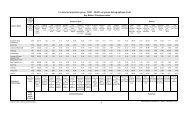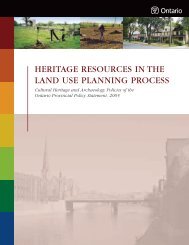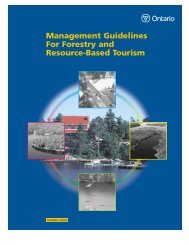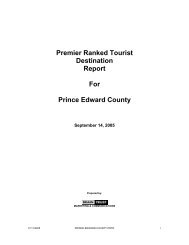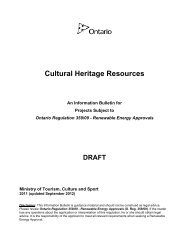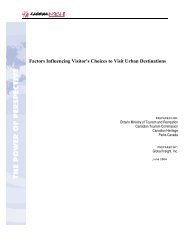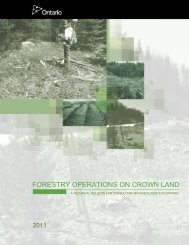Engaging Aboriginal Communities in Archaeology - Ministry of ...
Engaging Aboriginal Communities in Archaeology - Ministry of ...
Engaging Aboriginal Communities in Archaeology - Ministry of ...
- No tags were found...
Create successful ePaper yourself
Turn your PDF publications into a flip-book with our unique Google optimized e-Paper software.
4 Roles <strong>of</strong> Non-ArchaeologistsNon-archaeologists can be <strong>in</strong>volved <strong>in</strong> the archaeological assessment process and maytherefore play a role <strong>in</strong> <strong>Aborig<strong>in</strong>al</strong> engagement. This section provides an overview <strong>of</strong> theroles and responsibilities <strong>of</strong> proponents, approval authorities and the M<strong>in</strong>istry <strong>of</strong> Tourismand Culture <strong>in</strong> the archaeological assessment process.4.1 ProponentsProponents are your clients. They can be developers <strong>of</strong> land, resources or <strong>in</strong>frastructureand <strong>in</strong>clude private landowners, municipalities, other m<strong>in</strong>istries and prov<strong>in</strong>cial agencies.Several prov<strong>in</strong>cial statutes, such as the Environmental Assessment Act and the Plann<strong>in</strong>g Act,may require a proponent to undertake an archaeological assessment to ensure that adevelopment project will not impact archaeological sites. A proponent typically hires alicensed consultant archaeologist to undertake this work. The proponent is accountable tothe approval authority and is responsible for ensur<strong>in</strong>g that the development projectproposal mitigates any impacts to archaeological sites identified through the archaeologicalassessment.Often proponents engage with <strong>Aborig<strong>in</strong>al</strong> communities on the development project as awhole. In some cases, approval authorities require proponents to consult with <strong>Aborig<strong>in</strong>al</strong>communities to discuss the impact <strong>of</strong> the development project on <strong>Aborig<strong>in</strong>al</strong> rights. Asnoted, proponents may look for opportunities to harmonize their engagement orconsultation on the development project as a whole with your engagement on thearchaeological project. This may be more efficient for you, your client and the <strong>Aborig<strong>in</strong>al</strong>communities. However, the proponent’s engagement on the development project as awhole cannot replace engagement on archaeology. That requires your pr<strong>of</strong>essionalexpertise and a different level <strong>of</strong> dialogue with <strong>Aborig<strong>in</strong>al</strong> communities.4.2 Approval AuthoritiesApproval authorities <strong>in</strong>clude prov<strong>in</strong>cial m<strong>in</strong>istries (such as the M<strong>in</strong>istry <strong>of</strong> theEnvironment, the M<strong>in</strong>istry <strong>of</strong> Transportation, M<strong>in</strong>istry <strong>of</strong> Municipal Affairs and Hous<strong>in</strong>gand M<strong>in</strong>istry <strong>of</strong> Natural Resources) and municipalities. Approval authorities havelegislative authority to determ<strong>in</strong>e whether proposed development projects meet theirrequirements and can proceed. Archaeologists should also refer to the policies andprocedures <strong>of</strong> relevant approval authorities. For example, archaeologists work<strong>in</strong>g onforestry projects on Crown lands should refer to the M<strong>in</strong>istry <strong>of</strong> Natural Resources' 2007Forestry Management Guide for Cultural Heritage Values. Approval authorities typically awaitnotification that the M<strong>in</strong>istry <strong>of</strong> Tourism and Culture has accepted an archaeologist’sassessment report before they decide whether to grant approval for a development projectand determ<strong>in</strong>e whether conditions should be placed on an approval.Draft <strong>Engag<strong>in</strong>g</strong> <strong>Aborig<strong>in</strong>al</strong> <strong>Communities</strong> <strong>in</strong> <strong>Archaeology</strong> | 13



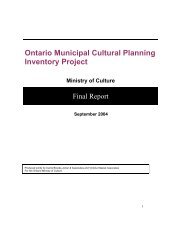
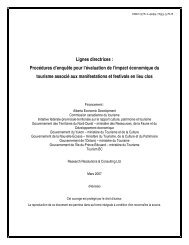
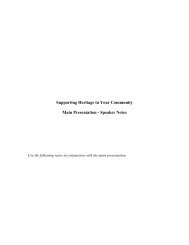
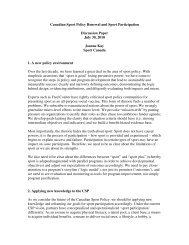
![THIS AGREEMENT made this [date], between [name of owner] (the ...](https://img.yumpu.com/49827605/1/158x260/this-agreement-made-this-date-between-name-of-owner-the-.jpg?quality=85)

